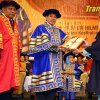KUCHING - The Health Ministry will build more rural health clinics in Sarawak and Sabah and continue with its mobile clinic services due to the vast expanse of both states.
Deputy Health Minister Datuk Seri Dr Hilmi Yahaya said the ministry was paying due attention to both states as their land areas were huge, coupled with challenging terrains and environmental factors.
“More health clinics will be built in the rural areas for the benefit of the people in these two states.
“Besides that, mobile clinics such as village health service and flying doctor service will be continued to provide health service to the rural folk.
“Healthcare personnel in rural areas will also be given sufficient training to ensure they have the skills and knowledge to provide the best service to the people,” he told reporters after officiating at the ministry’s training institutes’ convocation ceremony for Sarawak and Sabah graduates here yesterday.
Besides building clinics, Dr Hilmi said the ministry would also give due focus to train locals at its institute to produce more local manpower.
“I realise that Sarawak and Sabah require not only more clinics but also personnel.
“For that, we will provide training for locals. When they have completed their training, we will post them back to serve in their own areas.”
On graduates from the training institute, he said all of them would be posted to clinics and hospitals operated under the ministry.
“So, we do not face any problem with unemployment among our graduates as all of them will be absorbed (into the ministry’s clinics and hospitals). Within a year, we managed to produce about one third of 25,000 students in 33 training centres throughout the country.”
According to him, the Health Ministry also posted about 1,600 graduates from private colleges to clinics and hospitals under the ministry.
Earlier in his speech, Dr Hilmi said the role of training institutes was no longer solely on training human resources to fill vacancies. They must compete with the changes so that the learning and teaching processes would continue to be relevant.
“I hope all of the Health Ministry’s training institutes would continue to increase their competitiveness by strengthening their teaching and learning processes by strengthening the capacity of their trainers.”
Dr Hilmi said there must also be plans to expand and upgrade those involved in health sciences through advanced diploma courses or other specialised fields.
This is in view of the field’s growing importance under the National Key Economy Area (NKEA) to realise the Economic Transformation Programme (ETP).
“In September this year, six courses were upgraded to advanced diploma, namely cardiovascular health care, oncology, perioperative, intensive care, environmental and paliative health care.”
A total of 1,965 graduands from the ministry’s seven health and nursing training institutes in Sarawak and Sabah received their diplomas and certificates at the ceremony.
The diploma holders took courses in nursing, medical assistant, medical lab technology, and environmental health, while those who received certificates studied community nursing, public medical assistant and specialised courses in other fields.
Among those present at the convocation ceremony were the Health Ministry’s deputy director-general (Management) Datuk Hasnah Saleh, training management secretary Datuk Nadzri Siron and state health director Datu Dr Zulkifli Jantan.
Source: My Sarawak
Sarawak, Sabah To Have More Rural Clinics

